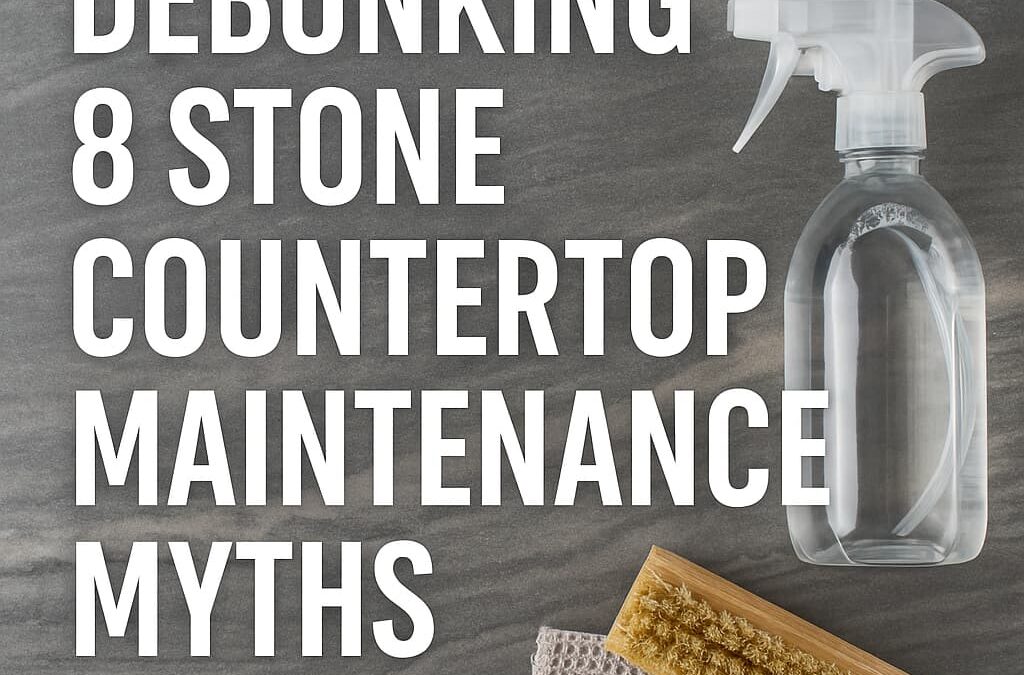Stone countertops — whether granite, marble, or quartz — are often seen as both beautiful and indestructible. But here’s the truth: many homeowners follow cleaning habits that actually shorten the life of their countertops. From using vinegar sprays to skipping sealing, myths spread quickly and lead to costly mistakes.
This guide debunks the eight most common stone countertop maintenance myths, so you’ll know what really works and what to avoid.
Key Takeaways
- Stone countertops are durable but not maintenance-free.
- Vinegar and lemon juice are unsafe for natural stone.
- Quartz does not need sealing, but granite and marble do.
- Heat and knives can damage stone — always use trivets and cutting boards.
- Professional care extends the lifespan of stone surfaces.
Myth #1: Stone Countertops Are Indestructible
Stone may be strong, but it’s not invincible. Granite can chip, marble can scratch, and quartz can discolor under high heat.
Truth: Stone is durable but still requires protection. Always use cutting boards and trivets.
Myth #2: Vinegar Is the Best Natural Cleaner
Many DIY cleaning blogs recommend vinegar for everything. But vinegar is acidic and damages stone sealants. Over time, it causes dull spots called etches.
Truth: Stick to pH-neutral cleaners or a homemade solution of dish soap + warm water.
Myth #3: Quartz Countertops Need to Be Sealed
Granite and marble require sealing because they are porous. Quartz, however, is engineered with resin, making it non-porous.
Truth: Quartz never needs sealing. Granite and marble should be sealed every 12–18 months.
Myth #4: Heat Won’t Damage Stone
Placing hot pans directly on granite or quartz can cause cracks, discoloration, or resin burns. Marble is even more sensitive to heat.
Truth: Always use trivets or hot pads, even with stone countertops.
Myth #5: Stone Doesn’t Stain
Wine, coffee, and oil can seep into granite and marble if left too long or if sealant is worn down. Quartz resists staining but is not stain-proof.
Truth: Wipe spills immediately. Seal natural stone surfaces to protect against stains.
Myth #6: Any Cleaner Works on Stone
Bleach, ammonia, and abrasive powders can ruin stone finishes. Even some “green” cleaners contain acids that etch surfaces.
Truth: Use stone-safe cleaners or DIY granite spray (isopropyl alcohol + water + dish soap).
Myth #7: Stone Countertops Don’t Need Professional Care
Some stains, chips, or scratches can’t be fixed with DIY methods. Professional restoration can reseal, polish, and repair surfaces for a fraction of replacement cost.
Truth: Call a stone care expert for deep restoration every few years.
Myth #8: All Stones Require the Same Care
Each stone has different maintenance needs. Granite is durable but porous, marble is soft and delicate, and quartz is low maintenance but heat-sensitive.
Truth: Learn the specific needs of your stone type for proper long-term care.
FAQs
Can I use baking soda on all stone countertops?
Yes, but only as a paste for stains. Avoid abrasive scrubbing.
How often should I seal granite?
Every 12–18 months, depending on usage.
Does quartz need polishing?
No. Quartz has a built-in resin shine. Just clean with mild soap.
Quick Stone Care Checklist
- Clean daily with mild soap + water.
- Avoid vinegar, bleach, and harsh cleaners.
- Use cutting boards and trivets.
- Seal granite/marble every 12–18 months.
- Call professionals for deep stains or chips.
Final Thoughts
Stone countertops are a major investment, but myths about their care often lead to costly mistakes. By avoiding vinegar, sealing when necessary, and using safe cleaning methods, you’ll protect your granite, marble, or quartz for decades.
Knowledge is the real key to durability. Don’t fall for the myths — treat stone surfaces with care, and they’ll reward you with beauty and strength that lasts.

As the chief content writer, Hassan Al Sarker works as a professional kitchen-based content creator at Kitchen Liker.
In addition to reviewing the content published on Kitchen Liker, he ensures that it is accurate, relevant, and helpful. As a result, all the reviews and information published at Kitchen Liker are neutral and userfriendly.
Hassan Al Sarker has a bachelor’s degree in Hotel and Tourism Management From the Newyork University. Before joining Kitchen Liker, he was a contributor at Kitchen Club, United States.

